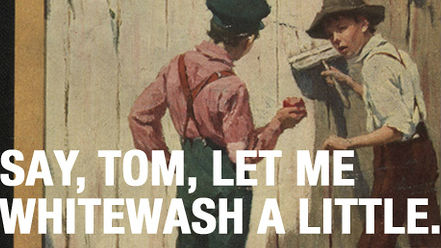Do “Tom Sawyer Wives” Take Advantage of their Husbands’ Breadwinning?

In Marriage Confidential I talk about “workhorse wives” with Tom Sawyer husbands. In these marriages, the husband is the dream-chaser and the wife is the exhausted breadwinner who underwrites his dream. For example, she’s a disgruntled lawyer, and he’s writing the great American novel. She’s an executive, and he’s trying his hand at an origami greeting card business.
This isn’t an equitable stay-at-home dad arrangement, or a case where the wife adores her work, and wouldn’t have it any other way. It’s a more lopsided case of the wife doing the lion’s share of the “life maintenance” work, often including childrearing. For her, the dream of having it all became the nightmare of doing it all.
But “Bob” tells me that he’s got a “Tom Sawyer wife.” He writes poignantly that he’s“115% the breadwinner” in his family. The “100% is money I earn from my job and spend on our family’s expenses. The other 15% is money I earn from my job and pour into my wife’s endeavors.” Bob’s wife, like many Tom Sawyer husbands, isn’t lazy. She works “extremely hard in pursuing her passions,” which Bob is in some ways happy to support, but they don’t generate income.
“She has a doctorate in a highly employable field,” Bob continues. This equips her “to do much more than raise children and make my dinner. She is using those opportunities to pursue her own interests, but relies on the man of the house to be in the workforce earning the money. It’s nice for her, but it’s no treat for me.” Bob concludes, “She’s Having it All, but I’m Supporting it All.”
Bob asks, “I’m not sure if I am a rare and unique sucker in this arrangement, or if I am part of significant minority that wanted equality in marriage but found it to take an unexpected twist.”
Bob, you’re not alone (I’ve been waiting to use that advice column-ish line). Other husbands have written to me about this situation.
The fair allocation of wage-earning is a newfangled and in some ways a happy marital dilemma, spawned by progress. In the 1950s world of educational and occupational inequality, women had so few chances for lucrative employment that they necessarily relied on husbands for support. After the Civil Rights Act of 1964 passed, which prohibited sex discrimination in employment, an airline executive worried in the Wall Street Journal, “what are we going to do when a gal walks into our office, demands a job as an airline pilot and has the credentials to qualify? Or, what will we do when some guy comes in and wants to be a stewardess?”He sincerely couldn’t imagine it. Amid concerns about the Vietnam draft and the end to sex quotas,aHarvard Law School dean complained, “we shall be left with the lame, the blind, and women” for students.
Obviously, times have changed. Women themselves changed them, through feminism. Today most of us marry our equals in career, earning potential, and education.
Under these circumstances, how does it feel for the husband or wife to become the sole breadwinner when we so often marry with every expectation, and option, that we won’t be saddled with exclusive wage-earning responsibility? As tough as it may be to ask this question: do we have a pre-feminist hangover in a post-liberation world, an anachronistic sense of entitlement to have the husband-as-sole-provider that can be resurrected from the dust bin of history when it’s convenient?
The husbands who’ve written to me sound like reasonable, responsible people. But they also feel that their marriage’s “contents have shifted in flight,” and gotten lopsided.
The only woman I’ve heard speak bluntly of the Tom Sawyer wife is happily married and childfree. Of her well-educated friends who’d opted out of the workforce, she asserted that they were “exploiting their husbands’ breadwinning guilt” to have a nicer life for themselves, with hired domestic help and passion-driven avocations.
Whoah. “Exploiting?” I’d never heard that said before.
It’s not that I hadn’t thoughtit. Secretly, some of the marriages I’d seen in the professional middle classes, between people fortunate enough to have decent dual-earning potential, had made me wonder.
In one case the husband and wife started as career equals. Their marriage started out liberated, and 21st century—and then took a U-turn back to the 1950s. He ended up in an unexpectedly lucrative field, tangentially related to his Ph.D. She wanted lots of children. Although they started out as career equals, she had three children and became a stay-at-home parent, while he worked.
When the money was easier to make and his office a reasonably pleasant environment, it might have felt like a fair arrangement for both.
Anyone who has even one child knows how hard it is to juggle two full-time jobs and childcare. It’s convenient to have a parent at home, and it works out nicely when the spouses feel like each of them is “pulling their load,” whatever that means to them.
This marriage got to feel less fair, however, as the husband’s work became more stressful and the financial markets collapsed. The mom had so much volunteer work that she hired an almost full-time nanny to look after the children. The wife was also pursuing a master’s degree in a field that she enjoyed, but this was another time and money-suck.
So, to state things bluntly, the financial benefits of not paying for childcare didn’t offset the husband’s sole breadwinner stress.
The husband grumbled about it to colleagues occasionally. But wasn’t this the ideal, to have a stay-at-home parent, and how could he complain without sounding as if he wanted to shirk responsibility (none of these workhorse spouses are shirkers). I’ve heard Workhorse Wives express a similar apprehension: how could they complain about their jobs, without sounding like failed feminists? Workhorse spouses more often nurse a mute, simmering resentment instead.
The bottom line is that being a marriage’s sole breadwinner can be a heavy weight to bear. That’s true of the workhorse wife, and of her counterpart. It’s psychologically stressful. It’s challenging to know that the room, board and wellbeing of three or more souls rest exclusively on your capacity to hold down your job.
It’s stressful to be the de facto exclusive caregiver to children, too.
Both are the stuff of life, and hopefully they bring us great joy, but they’re also gifts that a partner makes to the household.
Factions in the motherhood wars stake out positions on whether mothers’ wage-earning or opting out is a better choice, but the beauty of marriage today is that any arrangement can work (or fail )where “work” means: important functions get done, and spouses themselves feel that things are equitable, that their dreariness quotient is in balance. Both are doing enough of that unglamorous life maintenance work, however they define it—whether it’s chores, breadwinning, bread-baking, or childcare—to keep the household afloat.
Marital equity means that one spouse can’t always be the rock star, and the other the backstage roadie, who works the lights and orders pizza.
That applies whether the figurative roadie is the wife or the husband.





